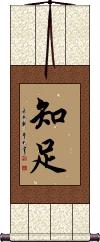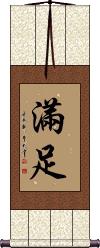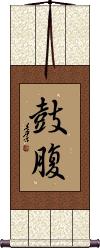Many custom options...
And formats...

Satisfaction in Chinese / Japanese...
Buy a Satisfaction calligraphy wall scroll here!
Personalize your custom “Satisfaction” project by clicking the button next to your favorite “Satisfaction” title below...
Contentment
知足 means content with one's situation or to know contentment (hence happiness).
From the Zen Buddhist context, Chisoku or 知足 (knowing what’s enough) means always to know and be
satisfied with one’s lot.
Human pain and suffering are born of greed, and that greed arises because we do not know what’s enough.
The Chinese philosopher, Menzi (372-289 BCE) said, “to nourish the mind, there is nothing better than to make the desires few.”
This relays the idea that the best method to cultivate the mind is to have little desire.
Happiness / Contentment
滿足 is the kind of happiness that involves being satisfied and content.
This can also suggest the actions of “to satisfy,” and “to meet the needs of.”
Other single-word definitions include satisfaction, contentment, sufficient, enough, adequate, full, or complete.
![]() In Japanese, the Kanji for this word is an alternate Chinese form. You can see and select this version at the right (recommended only if your audience is specifically Japanese).
In Japanese, the Kanji for this word is an alternate Chinese form. You can see and select this version at the right (recommended only if your audience is specifically Japanese).
See Also: Contentment | Pleasure | Well-Being
Happiness / Contentment
鼓腹 means happiness and contentment in Japanese Kanji.
The first Kanji represents your internal beat or drum.
The second Kanji represents your mind and body.
Together, it suggests that your internal rhythm or beat is regular, soothing, and at the proper tempo.
See Also: Pleasure | Well-Being
Ikigai
生き甲斐 is a Japanese word that means something one lives for, a reason for being, a purpose in life, or French, raison d'etre.
Everyone has an ikigai. Finding it requires a deep and often lengthy search for self. Finding your Ikigai is the way to also find satisfaction and meaning in life.
Your Ikigai could be almost anything. For some, it is running for president. For others, satisfaction is found in raising children.
Ikigai is why you get up in the morning; bringing meaning to your life and pursuing your Ikigai makes life worthwhile.
Hyakuren-Jitoku
百錬自得 is a Japanese proverb that means only if you practice something 100 times will it become a part of yourself.
Some translate it in a short form like “Well train, self-gain.”
The first two characters are a word that means “100 forges” (or to forge 100 times). It translates more naturally as well-tempered, well-drilled, or well-trained.
The last two characters mean “self-benefit” or “self-gain.” It can also be translated into English as contented, self-satisfaction, realizing (through one's ability), or being paid back for one's deeds.
Better to be Happy than Rich
安貧樂道 means “It's better to be happy than rich” in Chinese.
Even if you are poor, you should still feel satisfied in your life...
...Satisfaction, happiness and the meaning of your life come from within yourself and not from money or riches of the world.
In Chinese, there are a lot of four-character proverbs which express some very old philosophies.
Though there are only four characters on this scroll, in Chinese, the meanings often surpass the dictionary definition of each character.
In this case, you should not set your expectations too high for the money or riches you wish to have. One who sets their expectations too high is almost always disappointed. Instead, you should cherish what you have, seek to improve yourself from within, and not measure your worth by the size of your bank account.
Not the results for satisfaction that you were looking for?
Below are some entries from our dictionary that may match your satisfaction search...
| Characters If shown, 2nd row is Simp. Chinese |
Pronunciation Romanization |
Simple Dictionary Definition |
知足 see styles |
zhī zú zhi1 zu2 chih tsu tomotaru ともたる |
More info & calligraphy: Contentment(personal name) Tomotaru Complete knowledge; satisfaction. |
悦 see styles |
etsu えつ |
self-satisfaction; rejoicing; (female given name) Yoroko |
CS see styles |
shii esu; shiiesu(sk) / shi esu; shiesu(sk) シー・エス; シーエス(sk) |
(1) (See 通信衛星) communications satellite; (2) (See コンテナ船) container ship; (3) (See 顧客満足) customer satisfaction; (4) {med} (See 化学物質過敏症) multiple chemical sensitivity; (5) {baseb} (See クライマックスシリーズ) Climax Series (annual playoff system used by Nippon Professional Baseball); (6) (See コンピュータサイエンス) computer science; CS; (7) {vidg} (from "consumer software") console game |
ES see styles |
ii esu; iiesu(sk) / i esu; iesu(sk) イー・エス; イーエス(sk) |
(1) (See エントリーシート) job application form; (2) employee satisfaction |
会心 see styles |
kaishin かいしん |
(n,vs,adj-no) congeniality; satisfaction; gratification; (place-name) Kaishin |
喜足 see styles |
xǐ zú xi3 zu2 hsi tsu kitaru きたる |
(personal name) Kitaru satisfaction |
堪能 see styles |
kān néng kan1 neng2 k`an neng kan neng kannō たんのう |
(ateji / phonetic) (noun or adjectival noun) (1) proficient; skillful; (noun/participle) (2) enjoying; satisfaction; satiation; having one's fill (of); (noun or adjectival noun) (1) proficient; skillful; (noun or adjectival noun) (2) (Buddhist term) patience; perseverance; fortitude Ability to bear, or undertake. |
得意 see styles |
dé yì de2 yi4 te i tokui とくい |
proud of oneself; pleased with oneself; complacent (n,adj-na,adj-no) (1) satisfaction; pride; triumph; elation; (n,adj-na,adj-no) (2) one's strong point; one's forte; one's specialty; (3) regular customer; regular client; patron To obtain one's desires, or aims; to obtain the meaning (of a sutra). |
暗喜 see styles |
àn xǐ an4 xi3 an hsi |
hidden smile; smirk; to rejoice covertly; secret satisfaction concerning one's evil plans |
本望 see styles |
běn wàng ben3 wang4 pen wang motomi もとみ |
(1) long-cherished desire; (2) satisfaction (from achieving one's desire); (female given name) Motomi one's long-cherished desire |
満悦 see styles |
manetsu まんえつ |
(n,vs,vi) (usu. as ご満悦) great delight; great satisfaction; rapture |
満足 see styles |
michitari みちたり |
(adj-na,n,vs) (1) satisfaction; contentment; complacency; (noun or adjectival noun) (2) sufficient; enough; adequate; proper; (personal name) Michitari |
滿意 满意 see styles |
mǎn yì man3 yi4 man i |
satisfied; pleased; to one's satisfaction |
滿足 满足 see styles |
mǎn zú man3 zu2 man tsu manzoku まんぞく |
to satisfy; to meet (the needs of); satisfied; content (out-dated kanji) (adj-na,n,vs) (1) satisfaction; contentment; complacency; (noun or adjectival noun) (2) sufficient; enough; adequate; proper Full, complete. |
甘心 see styles |
gān xīn gan1 xin1 kan hsin kanshin かんしん |
to be willing to; to resign oneself to (noun/participle) satisfaction |
留飲 留饮 see styles |
liú yǐn liu2 yin3 liu yin ryuuin / ryuin りゅういん |
(TCM) edema; dropsy (noun/participle) gloating; satisfaction |
納得 纳得 see styles |
nà dé na4 de2 na te nattoku なっとく |
(n,vs,vt,vi) (1) consent; agreement; acceptance; (n,vs,vt,vi) (2) understanding; satisfaction (e.g. with an explanation); being convinced to internalize |
自得 see styles |
zì dé zi4 de2 tzu te jitoku じとく |
contented; pleased with one's position (noun/participle) (1) self-satisfaction; self-complacency; complacency; (noun/participle) (2) understanding (on one's own); realizing (through one's own ability); (noun/participle) (3) (See 自業自得・じごうじとく) being paid back for one's deeds; (given name) Jitoku |
自謙 自谦 see styles |
zì qiān zi4 qian1 tzu ch`ien tzu chien jiken じけん |
modest; self-deprecating (personal name) Jiken self-satisfaction |
自足 see styles |
zì zú zi4 zu2 tzu tsu jisoku じそく |
self-sufficient; satisfied with oneself (noun/participle) self-sufficiency; self-satisfaction |
し甲斐 see styles |
shigai しがい |
(kana only) (See やりがい) value in doing something; feeling that something is worth doing; rewarding feeling; sense of satisfaction |
充足感 see styles |
juusokukan / jusokukan じゅうそくかん |
feeling of fullness; sense of sufficiency; feeling of satisfaction |
思う儘 see styles |
omoumama / omomama おもうまま |
to one's heart's content or satisfaction |
満腹感 see styles |
manpukukan まんぷくかん |
feeling of a full stomach after a meal; satisfaction of having a full stomach |
満足度 see styles |
manzokudo まんぞくど |
(degree of) satisfaction |
満足感 see styles |
manzokukan まんぞくかん |
feeling of satisfaction |
滿意度 满意度 see styles |
mǎn yì dù man3 yi4 du4 man i tu |
degree of satisfaction |
滿足感 满足感 see styles |
mǎn zú gǎn man3 zu2 gan3 man tsu kan |
sense of satisfaction |
生死園 生死园 see styles |
shēng sǐ yuán sheng1 si3 yuan2 sheng ssu yüan shōji en |
The garden of life-and-death. This mortal world in which the unenlightened find their satisfaction. |
納得感 see styles |
nattokukan なっとくかん |
(feeling of) satisfaction (with an explanation, decision, arrangement, etc.); understanding (e.g. of the public); acceptance; agreement |
Click here for more satisfaction results from our dictionary
The following table may be helpful for those studying Chinese or Japanese...
| Title | Characters | Romaji (Romanized Japanese) | Various forms of Romanized Chinese | |
| Contentment | 知足 | chisoku | zhī zú / zhi1 zu2 / zhi zu / zhizu | chih tsu / chihtsu |
| Happiness Contentment | 滿足 / 満足 满足 | man zoku / manzoku | mǎn zú / man3 zu2 / man zu / manzu | man tsu / mantsu |
| Happiness Contentment | 鼓腹 | ko fuku / kofuku | ||
| Ikigai | 生き甲斐 | ikigai | ||
| Hyakuren-Jitoku | 百錬自得 | hyaku ren ji toku hyakurenjitoku | ||
| Better to be Happy than Rich | 安貧樂道 安贫乐道 | ān pín lè dào an1 pin2 le4 dao4 an pin le dao anpinledao | an p`in le tao anpinletao an pin le tao |
|
| In some entries above you will see that characters have different versions above and below a line. In these cases, the characters above the line are Traditional Chinese, while the ones below are Simplified Chinese. | ||||
Successful Chinese Character and Japanese Kanji calligraphy searches within the last few hours...









